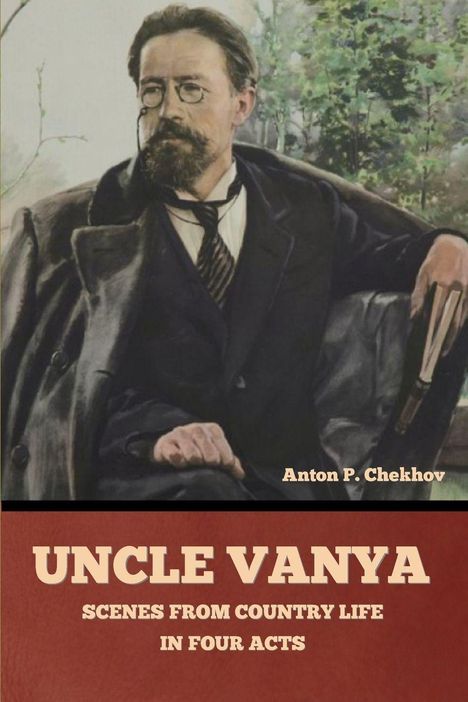Anton Pavlovich Chekhov: Uncle Vanya, Kartoniert / Broschiert
Uncle Vanya
- Scenes from Country Life in Four Acts
(soweit verfügbar beim Lieferanten)
- Verlag:
- Bibliotech Press, 08/2025
- Einband:
- Kartoniert / Broschiert
- Sprache:
- Englisch
- ISBN-13:
- 9798897732425
- Artikelnummer:
- 12456376
- Umfang:
- 162 Seiten
- Gewicht:
- 273 g
- Maße:
- 229 x 152 mm
- Stärke:
- 10 mm
- Erscheinungstermin:
- 29.8.2025
- Hinweis
-
Achtung: Artikel ist nicht in deutscher Sprache!
Weitere Ausgaben von Uncle Vanya |
Preis |
|---|---|
| Buch, Gebunden, Englisch | EUR 34,90* |
| Buch, Kartoniert / Broschiert, Englisch | EUR 14,90* |
Klappentext
Uncle Vanya: Scenes from Country Life in Four Acts is a play by Anton Pavlovich Chekhov, one of the most influential playwrights of the late 19th and early 20th centuries. It was completed in 1897 and first performed in 1899 at the Moscow Art Theatre under the direction of Konstantin Stanislavski.
Set on a rural Russian estate, Uncle Vanya follows the lives of several disillusioned characters grappling with wasted potential, unrequited love, and the monotony of provincial life. Vanya has spent years managing the estate for his brother-in-law, Professor Serebryakov, only to realize he's sacrificed his life for a man he despises. Tensions rise when the professor visits with his beautiful young wife, Yelena, stirring desires and resentments. Vanya attempts to break free but fails, and by the end, the characters resign themselves to their fates, clinging to duty and endurance rather than hope or change.
About the Author
Anton Pavlovich Chekhov (29 January 1860 - 15 July 1904) was a Russian playwright and short-story writer, widely considered to be one of the greatest writers of all time. His career as a playwright produced four classics, and his best short stories are held in high esteem by writers and critics. Along with Henrik Ibsen and August Strindberg, Chekhov is often referred to as one of the three seminal figures in the birth of early modernism in the theatre. Chekhov was a physician by profession. "Medicine is my lawful wife," he once said, "and literature is my mistress."
Chekhov renounced the theatre after the reception of The Seagull in 1896, but the play was revived to acclaim in 1898 by Konstantin Stanislavski's Moscow Art Theatre, which subsequently also produced Chekhov's Uncle Vanya and premiered his last two plays, Three Sisters and The Cherry Orchard. These four works present a challenge to the acting ensemble as well as to audiences, because in place of conventional action Chekhov offers a "theatre of mood" and a "submerged life in the text." The plays that Chekhov wrote were not complex, and created a somewhat haunting atmosphere for the audience.
Chekhov began writing stories to earn money, but as his artistic ambition grew, he made formal innovations that influenced the evolution of the modern short story. He made no apologies for the difficulties this posed to readers, insisting that the role of an artist was to ask questions, not to answer them. (wikipedia. org)

